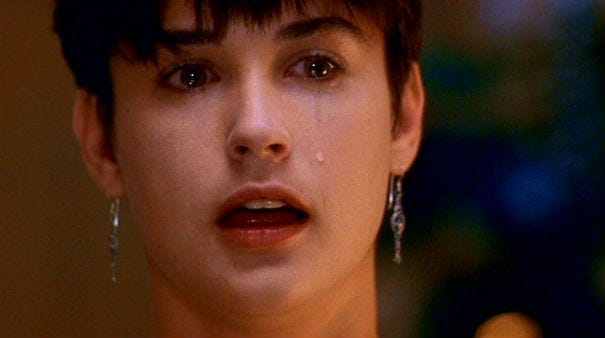Ghost
Demi, our emotional sherpa
If Demi Moore used The Substance, it’s not Margaret Qualley, a creature equal parts perky and vacuous, who would emerge from her body. If, as advertised, The Substance created the perfect version of a person, Moore would be reborn as her character from Ghost, Molly Jensen.
In Molly Jensen, we get a 26-year-old Demi Moore near the peak of her physical beauty (a plateau she has spent most of her life on), yet she eschews her physical gifts rather than incorporating them into the character. She has a Dumb and Dumber pageboy haircut that would look ridiculous on anyone else and hides her slender form behind chunky sweaters and overalls. She wears only touches of makeup, leaving her perfect imperfections exposed, like the small pockmark on her left cheekbone.
The movie tries valiantly to minimize Moore’s body, only failing at times, like when we see brief glimpses of her thighs when she’s working the pottery wheel or her bare back, bisected by the strap of a white, lacy bra that seems harsh and abrasive only when juxtaposed against her soft, creamy skin. She’s not hiding her body out of shame and modesty like a young Amish woman returning from Rumspringa and attempting to put the genie of her sexuality back into the bottle. But rather, refreshingly, her body is an afterthought. It doesn’t represent who she is. It’s merely an imperfect vehicle for her soul.
Ghost begins as if it were intended to be a horror movie, but the producers changed their mind abruptly as filming began. There’s a loud, otherworldly tone that catches you unaware as the title flashes on the screen before quickly disappearing. Sinister music plays while the camera pans across a dusty attic filled with foreboding shapes of objects long abandoned by previous owners, covered in shrouds and rags. Then, we see Molly, Sam (Patrick Swayze), and Carl (Tony Goldwyn) punch through the ceiling of the apartment they are renovating as Molly and Sam’s future home, and the creepiness is suddenly abandoned, replaced by a hopeful, home-improvement show vibe.
Ghost mostly takes place in Tribeca (Triangle Below Canal Street, kind of like how incel comes from involuntary celibate) in NYC, which also hilariously houses the Ghostbusters’ headquarters. NYC was dirty and dangerous at the time. The movie was released in 1990, the year NYC homicides peaked.
Swayze plays a banker and Moore an artist, but again, this is a different time, and there’s less separation between the two jobs. Before the housing and mortgage crises, being a banker did not necessarily make you an immoral asshole, cokehead, destroyer of worlds.
The movie has two halves — not before and after Swayze’s character, Sam Wheat, gets murdered (threshed?) and becomes a ghost, but rather before and after Whoopi Goldberg makes her entrance. Those who know Whoopi primarily through The View might not realize what a comedic force she was in the ‘80s and ‘90s. She used to headline Comic Relief with Robin Williams and Billy Crystal to raise money for the homeless. Whoopi plays Oda Mae Brown, a flamboyant con-artist spiritualist, and provides the humor needed to balance Moore’s emotional performance. She is the other side of the coin for Molly, the ballast that keeps the movie from tipping into dreariness.
Ghost is about pining for someone you love, encapsulated by “Unchained Melodies,” the song that plays during the famous pottery wheel scene (which, to this day, is the most erotic and sexually confusing scene I’ve seen in a movie). Moore’s performance is crucial to the movie. She’s the conductor of our emotions, guiding us by example through the movie’s emotional beats. Like the charts of smiling and frowning faces sociopaths use to learn empathy, she helps us identify and experience grief, yearning, disbelief, hope, and love. Deemphasizing Moore’s physique frees up bandwidth, allowing us to focus on the emotions revealed on her face and the way her spirit shines through her flesh, if that is how we can understand emotion.
Ghost
Written by Bruce Joel Rubin; Directed by Jerry Zucker
1990
126 minutes
English
Recommended way to watch (at time of publication): Kanopy (It’s free if you have a library card!)
You’ll like this if you like: The Bodyguard (1992), Indecent Proposal (1993)

